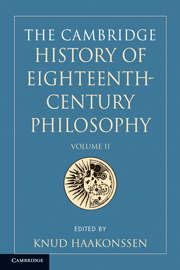Book contents
- Frontmatter
- III Philosophy and Theology
- 21 Natural and Revealed Religion
- 22 Revealed Religion: the Continental European Debate
- 23 Revealed Religion: The British Debate
- 24 Arguments for the Existence of God: The British Debate
- 25 Arguments for the Existence of God: The Continental European Debate
- 26 The Problem of Theodicy
- 27 Religion and Society
- IV Natural Philosophy
- V Moral Philosophy
- Biobibliographical Appendix
- Bibliography
- Index nominum
- Index rerum
- References
22 - Revealed Religion: the Continental European Debate
from III - Philosophy and Theology
Published online by Cambridge University Press: 28 March 2008
- Frontmatter
- III Philosophy and Theology
- 21 Natural and Revealed Religion
- 22 Revealed Religion: the Continental European Debate
- 23 Revealed Religion: The British Debate
- 24 Arguments for the Existence of God: The British Debate
- 25 Arguments for the Existence of God: The Continental European Debate
- 26 The Problem of Theodicy
- 27 Religion and Society
- IV Natural Philosophy
- V Moral Philosophy
- Biobibliographical Appendix
- Bibliography
- Index nominum
- Index rerum
- References
Summary
The two extremes of eighteenth-century reflection on the foundations of revealed religion are marked in continental Europe by two major German philosophers: Gottfried Wilhelm Leibniz and Georg Wilhelm Friedrich Hegel. The beginning of the century saw the last, productive years of Leibniz’s life – years in which doctrines already present in his youth, matured and refined during the course of many decades, were finally committed to paper in such works as the Nouveaux essais (1703–1705), the Théodicée (1710), the Monadologie (1714) and the Principes de la nature et de la grace (1714). The end of the century saw the appearance of the early writings of Hegel, known as his Theologische Jugend-schriften (1793–1800) – writings which disclose the origins of Hegel’s dialectic and exhibit in a graphic way, through the consideration of the figure of Jesus, the shift from the Enlightenment-Kantian interpretive paradigm of Christian religion to the new dialectical paradigm. The change of perspective during the intervening century regarding the philosophical justification of revealed (or, as it would increasingly be called, positive) religion could hardly have been more radical. Leibniz summarised the debate on the relationship between faith and reason inherited from an ancient tradition and renewed in the sixteenth and seventeenth centuries in all its urgency by the Protestant Reformation, and he gave the thesis of the conformity between the two perhaps its most coherent expression. Hegel opened the door to the nineteenth century with a new set of philosophical issues regarding the value and foundations of revealed religion.
- Type
- Chapter
- Information
- The Cambridge History of Eighteenth-Century Philosophy , pp. 666 - 682Publisher: Cambridge University PressPrint publication year: 2000
References
- 1
- Cited by

